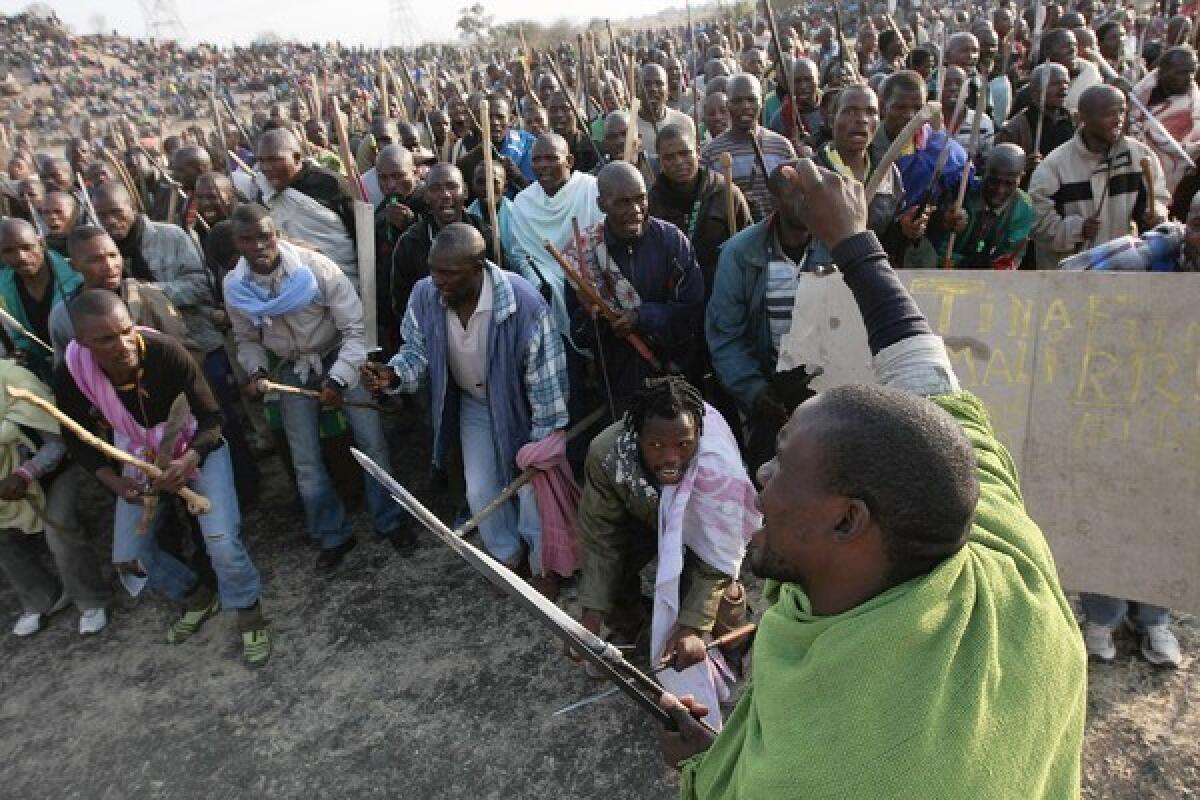South Africa ‘strike season’ may get much worse after Lonmin deal

- Share via
JOHANNESBURG, South Africa — Last month, it was South African platinum miners out on strike. This month they have been followed by other platinum miners, gold miners, coal miners and truck drivers, as workers race to match last week’s 22% wage gain won by Lonmin platinum workers after a wildcat strike at the company’s Marikana facility.
Analysts warned Wednesday of more rogue strikes, increasing union militancy and pressure for matching wage gains, with workers abandoning existing wage agreements and their unions, as the Lonmin miners did.
Every year, South Africa’s “strike season” sees millions of working days lost, usually shrugged off by international investors as the price of doing business here. In 2011, 2.8 million days were lost, according to the Labor Department.
But this year’s strike season has been different. The chaos of cascading wage demands has reverberated around the globe, spooking investors and putting pressure on South Africa’s currency, the rand.
The Lonmin deal undercuts the old certainties of South Africa’s industrial relations act: that one majority union, usually allied with the ruling African National Congress, or ANC, negotiates on behalf of all workers at a business.
“There’s no question it has caused massive damage to us and incredible damage to South Africa’s mining sector,” said Albert Wocke, an associate professor at University of Pretoria’s Gordon Institute of Business Science. “The government needs to step up and reassure investors. We have got a combination of this, and an unstable, almost unpredictable regulatory regime. They’re not applying regulations consistently on the mining companies. From an international perspective this is very confusing, and confusion means high risk.”
In an increasingly unpredictable environment, companies will have to deal with small breakaway unions or angry workers who have rejected any unions. Wage bills will mount, mines will shut down shafts, jobs will be lost and South Africa’s productivity and gross domestic product may decline, economists predict.
Workers at Gold Fields Ltd., AngloGold Ashanti, Anglo American Platinum Ltd., Coal of Africa Ltd. and truck drivers are on strike, prompting fear that a fuel shortage could seize the economy if the drivers stay away from work. Police have warned employers not to send trucks into central Johannesburg after protesting drivers stoned vehicles Tuesday.
“Our strikes are generally violent,” Wocke said. “At the moment, it’s a very tough environment to invest in.”
He said the wage demands would continue for several months but would eventually stabilize. Although some employers accommodated demands, others were likely to fire strikers en masse.
Political analyst William Gumede said the Lonmin settlement put unions and the major trade union council, COSATU, under severe pressure to meet workers’ demands. He predicted the council, which is aligned with the ANC, and its unions would adopt more militant tactics to hold on to members.
“The key thing about Marikana is the sense that the traditional trade unions and COSATU clearly lost credibility on the ground among their own members,” Gumede said. “The Marikana miners circumvented the system when they went outside the unions and the system of collective bargaining. Workers sent their own representatives to negotiate and at the end of the day those representatives came up with better deals.
“Other mining sector workers are going to do the same because they have seen their colleagues win this major victory without trade unions,” he said. Unions are “going to be tougher in their demands for parity with Marikana, so they look better to their workers.”
Gumede warned that strikes might turn more violent after the public backlash over police killings of 34 Marikana miners.
“I think the police will feel constrained in how they deal with these strikes now,” he said. “They’re going to be softer because they know they’re being watched by the public. That will create the kind of environment for striking workers to push the envelope on the violent side, knowing that they’re not going to be as firm now as a consequence of Marikana.”
The protests underscore a loss of faith in institutions that people once trusted, including the ANC.
“The biggest red flag is that people might actually start losing their trust in democracy as a protective mechanism and a framework to deliver them goods,” Gumede said.
Wocke said the ANC was losing the support of South Africa’s poor, who are disenchanted with the lack of service delivery, and new political parties might emerge in coming years to represent poor blacks. “But I don’t see the ANC becoming a minority any time soon.”
The ANC is to hold a party conference in December where opponents of President Jacob Zuma hope to mount a leadership challenge. In addition, the party will debate nationalization, a policy that could further alienate international investors.
More to Read
Sign up for Essential California
The most important California stories and recommendations in your inbox every morning.
You may occasionally receive promotional content from the Los Angeles Times.









